We purchased a 2003 Ford Explorer for $3,000 in 2016. We have put in probably under $2,500 in maintenance since then. Thus, over five years for $5,500, not, of course, including gasoline.
We have traveled in this 2003 Explorer between Red Bluff, California up to Portland and then north to Bellingham, Washington. From Okanagon, WA, Hanford, Yakima, all parts of The Columbia Gorge, the high deserts of the Columbia Plateau, and everywhere in Oregon. The fabulous Pacific Coast from Bodega Bay, CA, to Port Orford, OR, to Cape Flattery, Makah Indian Reservation, Neah Bay, WA.
We have many fond memories of our travels together, Karen and I. Also, many trips with family and friends. That old reliable 2003 Ford Explorer tackled all the hills and valleys of the Cascades, and provide all the suburban ease (e.g., good heat in the SUV, space for outdoor recreation gear, etc.).
However, it is now time for me to give this old 2003 Ford Explorer to my son to sell and keep the proceeds. This old Explorer SUV runs fine, has OK tires, 4WD, 120,000 miles, a few rusted areas in roof, ... yet still may have some practical uses for on the cheap (mas o menos $1,300??) for somebody else.
So, what other used car to choose? 1. A SUV that my wife is very comfortable driving. She does most of our driving, because she likes to drive the most and is a very safe driver. 2. Under the amount we have saved for cash purchasing. 3. Under 40,000 miles. 4. A newer Ford product.
So, we purchased and are now (2/27/2021), driving a 2018 Ford Escape, Titanium Model, SUV, AWD, 4 cylinder, 2.0 L engine, 22-27 mpg. This SUV has 35,100 miles on its bones and engine. The 2.0 L Turbocharged engine can put out 245 horsepower. Reviews?
The Ford Escape SUV has many safety features and road handling AWD capabilities, and meets all the Washington State emission control and road safety standards of 2018. This model uses a Sony electronic, audio, and communication system. There is plenty of room in our "new" Ford Escape for loading groceries from the Kroeger Fred Meyer's in the Orchards area. Or, room for moving gardening supplies and plants, boxes, travel gear, clothing, lunches and coffee, and recreational gear. This SUV model has new tires, good handling and AWD stability and adaptability, good lights, and is silver in color.
99.9% of the time there are either one or two persons in the car. We will not be towing anything, or carrying any gear on the hard top of this Ford Escape vehicle. We rarely camp anymore; and stay in motels, cabins, or hotels. Besides suitcases, we have a variety of recreational gear (boots, camera, backpack, maps, emergency supplies, raingear, tools, folding chairs, blankets, backup food and water, backup clothing, toiletries, auto stuff, etc.) to carry on some day trips or overnight trips. Plenty of room for two travelers!!
This kind of newer used card should provide good service for our uses for many years in Southwestern Washington, Clark County, Washington. We have traveled many U. S Interstate highways and roads, Washington and Oregon State roads, U.S. Forest Service Roads, local Clark County roads and backroads into and through and over the Cascades to the east of Vancouver, WA. This Ford Escape should have plenty of power and safety features for two auto travelers in our typical 150 mile and less radius of travel ... Portland Metro and Beyond from Desert to Mountains to River Valleys to the Pacific.
Post from 2019
Travel and Camping in 2019
Traveling in an SUV (2003 Ford Explorer)
2019-2020
Northwest United States and British Columbia
Camping Notes, Equipment, Plans, Experiences
By Mike Garofalo
January 2019
Travel in Washington, Oregon, Northern California, and B.C.
Books, Maps, Travel Guides, Natural History Manuals, Maps
Bibliography, Links, References, Notes
By Mike Garofalo
From 2006-2019
My Travel Plans for 2019-2020
I write about these short travel adventures in my Cloud Hands Blog. Follow the adventures by the Category Labels: Oregon, Southwestern Washington, Washington, Travel, Camping.


















